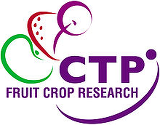REFERENCE: CTP_FCR_2020_4
Supervisors: Dr Michelle Hulin (NIAB EMR), Dr Richard Harrison (NIAB EMR), Prof John Mansfield, Dr Glyn Barrett (University of Reading)
This student will be registered with the University of Reading. Beginning in October 2020, the successful candidate should have (or expect to have) an Honours Degree (or equivalent) with a minimum of 2.1, in Plant Science, Plant Biology, Microbiology or other related subjects.
Background
Bacterial canker is a major disease of cherry caused by various Pseudomonas syringae pathogens that occupy different tissues throughout the season. Resistance breeding could play a large role in limiting this disease. Our research has shown that broad-acting partial resistance towards all pathogens is exhibited by some cherry cultivars. This resistance is likely to be quantitative, involving a range of traits. In contrast, wild cherry accessions exhibit strong resistance that may be simply inherited and involve one or a few major genes. Ongoing work on bacterial canker has shown that different tissues vary in their susceptibility. Field resistance is not replicated fully in leaf and fruit tests.
Objectives and approaches
This PhD project will focus on characterising the genetic basis of resistance by genotyping and phenotyping wild and sweet cherry populations propagated at East Malling, with the aim to identify novel sources of resistance to canker. This would lead to the development of molecular markers for use in breeding. In addition, the student will begin to study the biological basis of resistance responses in different host tissues.
The student will first optimise assays to understand immune responses e.g. measurement of reactive oxygen species and study immune gene expression. They will use microscopy of fluorescently tagged strains to follow infection and bacterial mutants to dissect the immune responses occurring. The research work consists of three work packages:
WP1: (i) Development of laboratory-based assays to study immune responses in different cherry tissues towards P. syringae; and (ii) gene expression study in cherry to identify genes involved in immune responses.
WP2: (i) Determine if resistance identified in wild cherry is due to a heightened basal or PAMP-triggered immune response using flg22 and P.syringae TTSS mutants; and (ii) effectoromics techniques will also be investigated to identify resistance towards particular bacterial effector proteins (effector-triggered immunity). This will utilize an established effector polymutant Pseudomonas strain generated in our lab.
WP3: (i) Genotyping and phenotyping cherry populations for bacterial canker resistance; and (ii) genetic mapping of loci involved in resistance and tolerance towards one or all bacterial clades and specific effector genes using established cherry populations.
Training
The successful candidate will gain a wide range of experience in plant pathology, plant breeding and molecular biology, including statistical analyses and bioinformatics.
Application
Anyone interested should return the application and equal opportunities forms to recruitmentctp@emr.ac.uk citing the reference before the deadline of 28th February 2020.
Contact Dr Michelle Hulin (michelle.hulin@emr.ac.uk) for an informal discussion.
